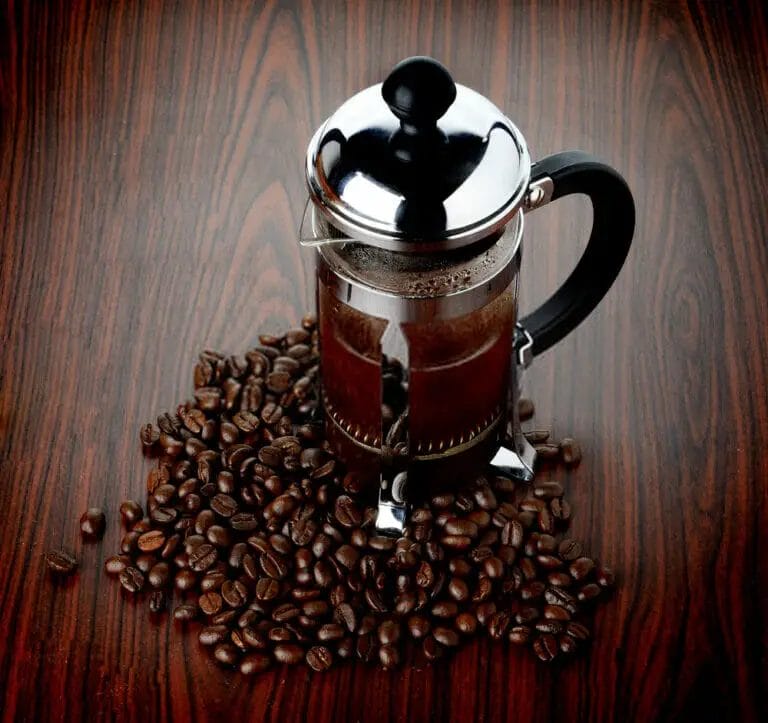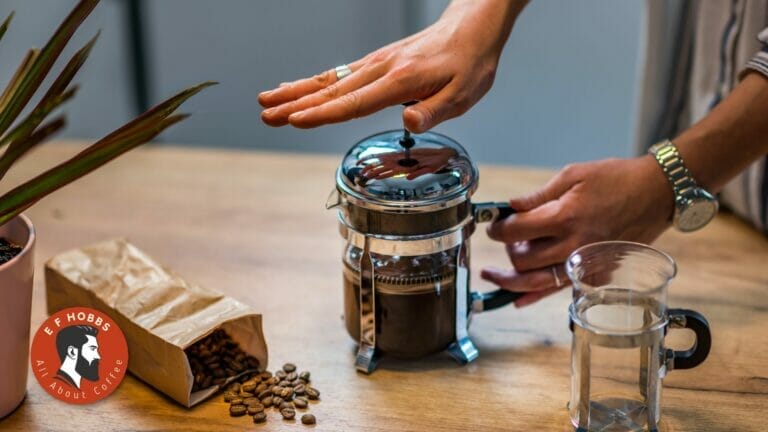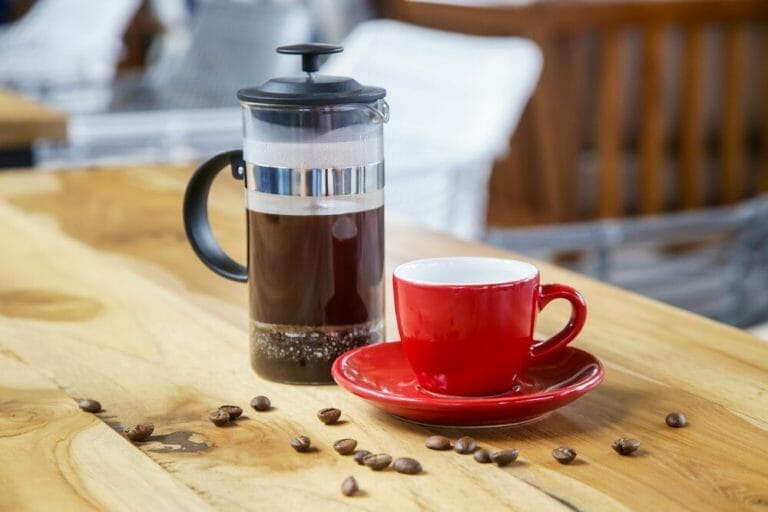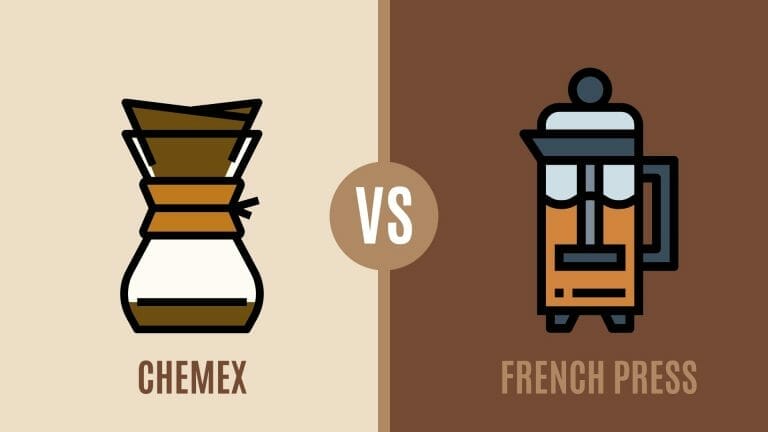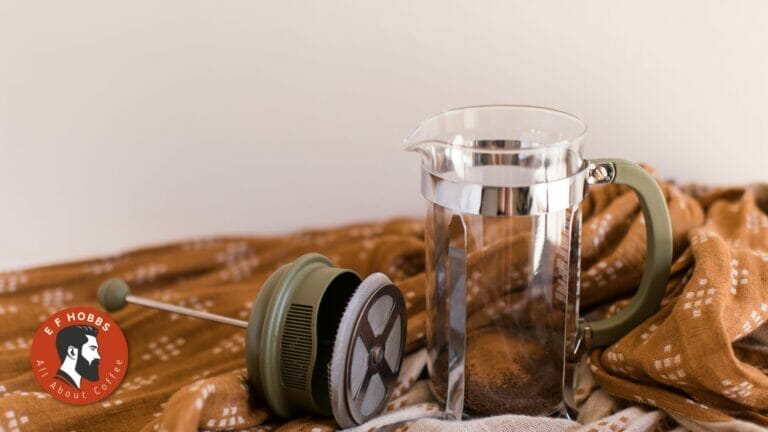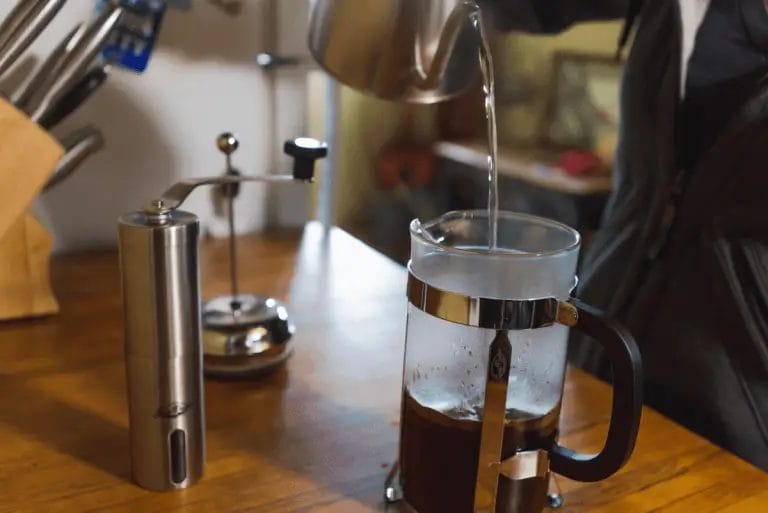Can I Use Regular Ground Coffee In a French Press?
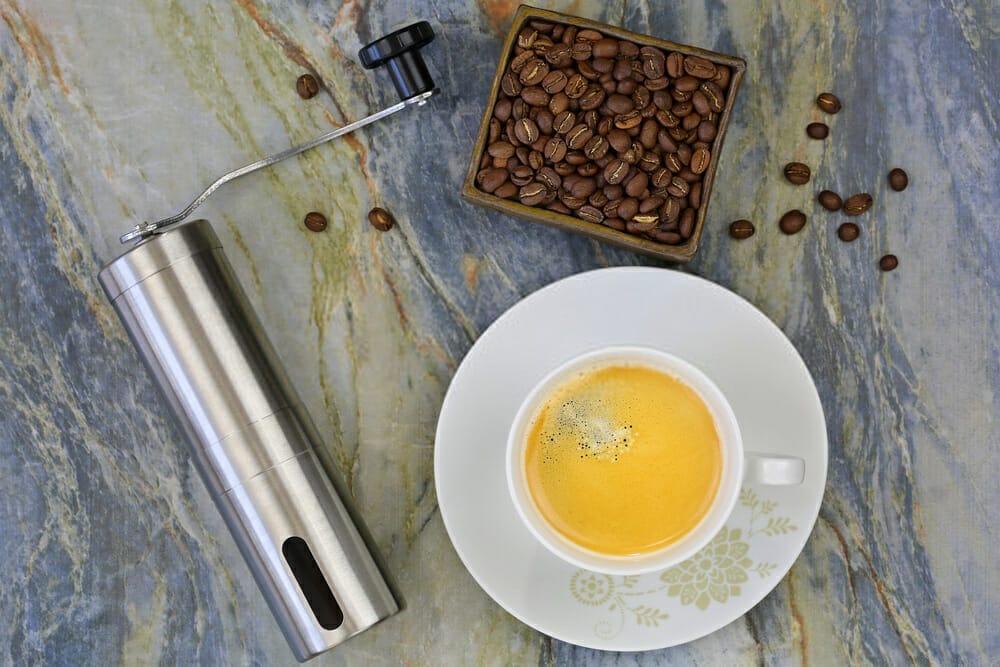
Key Takeaways
- Regular ground coffee can be used in a French press to produce a high-quality cup of coffee.
- The standard grind size found in grocery stores or basic home grinders is suitable for French press.
- Adjustments to brew time and water-to-coffee ratio are necessary when using regular grounds.
- Experimentation is key to finding the perfect pairing of coffee bean varieties and grind sizes.
Direct Answer: Regular Ground Coffee in a French Press
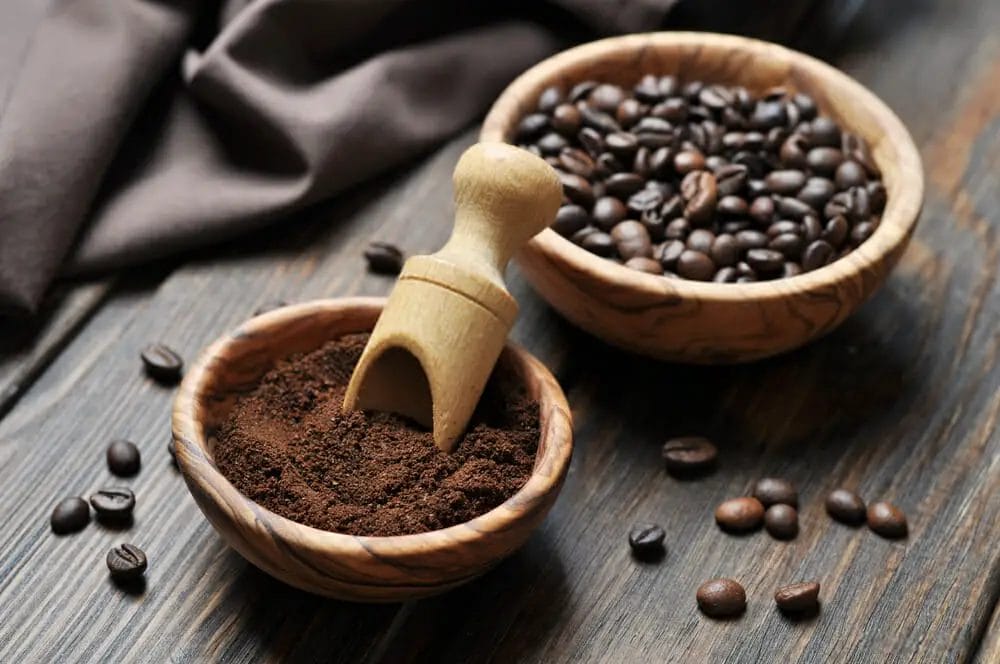
Yes, you can totally use regular ground coffee in a French Press for a unique and intense flavor experience!
While the coarser grind often associated with French Press brewing may result in a distinct flavor profile, using regular ground coffee provides an exciting alternative option.
It’s important to note that the taste differences between the two brewing processes are noticeable, so be prepared for a new and possibly surprising taste experience.
When using regular ground coffee in your French Press, it’s crucial to adjust the brew time and water-to-coffee ratio accordingly.
Since regular ground coffee is finer than coarse-ground coffee typically used in French Presses, it requires less time to steep to avoid over-extraction.
Adjusting the ratios will also ensure that you achieve a balanced cup of joe without an overpowering or diluted taste.
With proper adjustments and experimentation with different types of coffee blends, using regular ground coffee in your French Press can provide an exciting twist on traditional brewing methods.
Unpacking the Dynamics of Regular Ground Coffee in a French Press
Looking for a richer and more full-bodied flavor in your French Press coffee? Consider exploring the dynamics of finer grinds.
While coarse grind is usually recommended for French Press, regular ground coffee can provide a unique taste profile that cannot be achieved with coarser grinds.
However, it is important to keep in mind that using regular ground coffee requires adjusting your brewing techniques to achieve optimal results.
To understand the dynamics of regular ground coffee in a French Press, let’s take a look at this table comparing regular ground coffee and coarse ground coffee:
| Factors | Regular Ground Coffee | Coarse Ground Coffee |
|---|---|---|
| Extraction Time | Shorter extraction time | Longer extraction time |
| Flavor Profile | Stronger flavor profile | Milder flavor profile |
| Potential Issues | May result in over-extraction | Requires longer steeping time |
As you can see from the table, regular ground coffee has a shorter extraction time compared to coarse grind.
This means that when using regular grounds, you need to adjust your brewing technique accordingly by reducing the steeping time to avoid over-extraction which can result in bitter flavors.
Additionally, because of its finer size, there may be potential issues such as sediment or grounds escaping into your cup if not filtered properly.
It’s also essential to consider the correct ratio of coffee to water when brewing with regular grounds since they tend to dissolve more quickly than coarser grounds.
By experimenting with different ratios and brewing techniques, you can achieve a unique taste experience that highlights the specific characteristics of each type of bean and roast level.
Potential Pitfalls with Regular Ground Coffee in a French Press
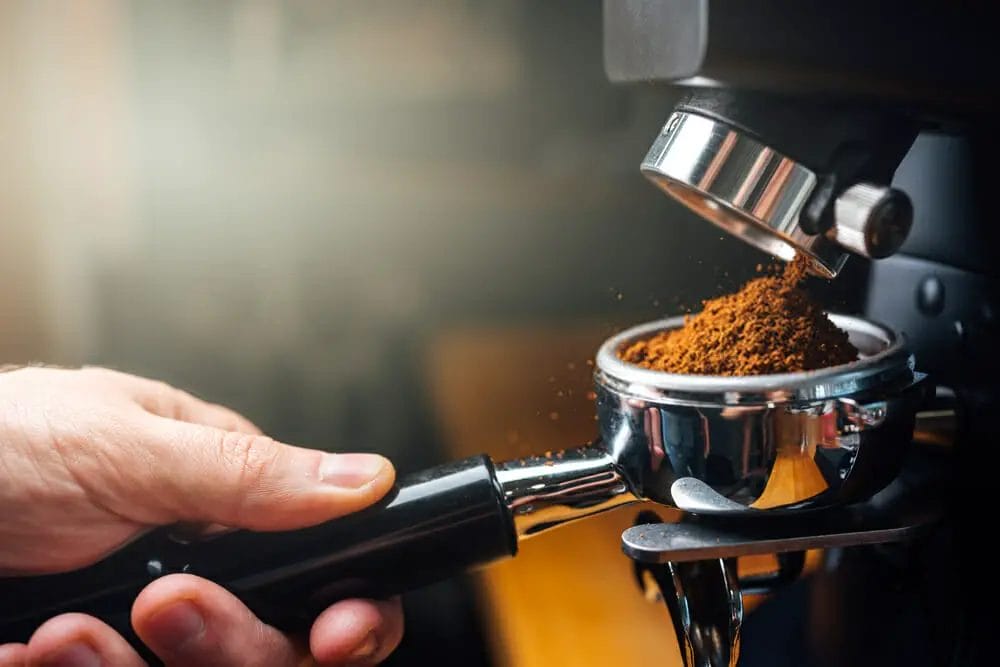
Be careful when brewing with finer grinds in your French Press, as they can lead to a sludgy texture and over-extraction if left steeping too long.
This is because regular ground coffee produces a higher volume of fines, which are tiny coffee particles that can escape through the metal filter and create an uneven extraction.
When this happens, you might notice a thicker consistency in your cup, which some people describe as having a sludge-like texture.
Another potential pitfall is clogging. Regular ground coffee tends to be smaller than coarse grounds, so it’s easier for them to clog the filter and prevent water from passing through.
This can result in longer steep times and a bitter taste due to over-extraction. To avoid these issues, try using coarser grounds or adjusting your brew time accordingly.
You can also experiment with different types of filters or grind sizes until you find what works best for you.
Best Practices for Using Regular Ground Coffee in a French Press
To achieve a smooth and balanced cup of joe, start by selecting the right grind size for your brewing method in order to avoid sludgy textures and bitter flavors.
When using regular ground coffee in a French Press, aim for a medium-coarse grind size that allows water to pass through easily while still providing enough surface area for optimal extraction.
In addition to grind size, there are other factors that can affect the taste of your coffee when using regular grounds in a French Press.
Pay attention to water temperature, aiming for between 195°F and 205°F for best results.
Steep time is also crucial: while coarse grounds might need 4 minutes to fully extract their flavor, regular grounds may be ready after just 2.5-3 minutes.
By carefully controlling these variables, you can create a delicious cup of coffee with just your French Press and some regular ground beans.
Enjoying Your French Press Brew with Regular Grounds
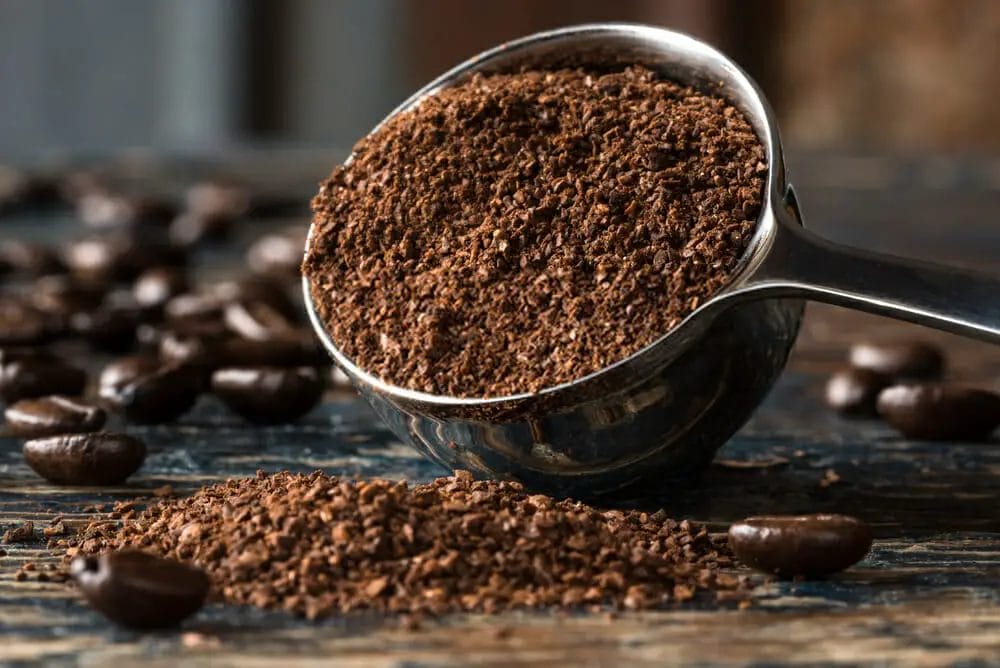
Indulge in the rich and full-bodied flavor of a French Press brew made with regular grounds, pairing it with a decadent chocolate croissant or smoky bacon and eggs for breakfast.
The bold flavor profile of this brewing method is perfect for complementing hearty foods that might otherwise overpower other types of coffee.
Experimentation is key when it comes to finding the perfect pairing for your French Press brew, but don’t be afraid to try something new.
To fully appreciate the nuances of flavor in your French Press coffee made with regular grounds, pay attention to the grind size and brewing time.
A coarser grind will result in a less bitter cup, while a finer grind will extract more oils from the beans and create a stronger taste.
Similarly, longer brewing times can lead to over-extraction and a bitter aftertaste.
With practice and experimentation, you’ll find the perfect balance between grind size, brewing time, and flavors that suit your personal preferences.
Use the table below as a starting point for discovering which coffee bean varieties pair well with regular ground in your French Press brew.
| Coffee Bean Variety | Tasting Notes | Pairing Suggestions |
|---|---|---|
| Single-origin Ethiopian | Floral notes with hints of citrus and berry | Light breakfast pastries like scones or muffins |
| Colombian-Guatemalan blend | Balanced acidity with notes of chocolate and nuts | Smoked meats like ham or sausage |
| Indonesian Sumatra | Earthy tones with hints of spice and caramel | Sweet treats like cinnamon rolls or fruit tarts |
| Kenyan AA | Bright acidity with complex fruity notes | Fresh berries or tropical fruits like mango or pineapple |
Remember that these are just suggestions – feel free to experiment with different blends and roast levels until you find what works best for you!
FAQs
Final Thoughts
In summary, using regular ground coffee in your French Press can open up a world of delightful possibilities in terms of flavor and aroma.
By mastering the art of tweaking brewing time, adjusting water-to-coffee ratios, and experimenting with various bean varieties, you can create personalized coffee experiences that captivate the senses.
Remember that there’s no strict one-rule-fits-all when it comes to coffee – embracing your unique preferences fuels the journey of coffee exploration.
So go forth, dear coffee lovers, and let your taste buds be your guide while enjoying every sip of your French Press brew made with regular grounds.
Cheers to the perfect cup! ☕💕

